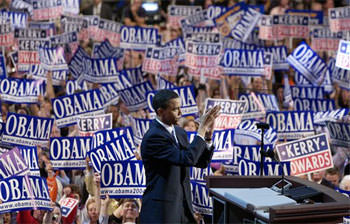The Trouble With ‘Political Rock Stars’
The pundits' latest catchphrase is insulting to the traditions of both politicians and rock stars.
As a follower of both politics and rock ‘n’ roll, I’m deeply troubled by the pundits’ phrase of the moment, “political rock star.” Of late, it has been applied widely, describing the popularity of everyone from Barack Obama (“our soaring rock star,” in the words of the Chicago Sun-Times) to U.N. Ambassador John Bolton. But in my view the now-ubiquitous term insults the traditions of both politics and rock ‘n’ roll, two of the central institutions in American life.
First off, the syntax is troubling. “Political” here is an adjective, and so if applied literally, “political rock star” would refer to figures like Bono, a musician turned international statesman. Yet since what the pundits really mean — a “rock star-like politician” — is a rather less appealing turn of phrase, I’m sure that Bono, Moby, Michael Stipe and other genuinely political rock stars won’t fight for the cause of syntactic purity.
Part of the problem is that baby boomer politicians pursue the label of rock star so intently. Who can forget Bill Clinton’s Elvis-like entrance onto the main stage of the Democratic National Convention in 2000? Though a sworn devotee of the wretched “pop-jazz” sounds of fellow sax player Kenny G, while in office Clinton more often behaved like Jim Morrison. Being pleasured by Monica Lewinsky while discussing appropriations with a Deep South legislator was just one example.
More recently, the most glamorous ex-president in American history actually fused politics with rock ‘n’ roll when the Rolling Stones performed at his 60th birthday party/fundraiser for the Clinton Global Initiative. Bill, said one Canadian observer, “has always been a political rock star and he isn’t going to fade away. Nor will the groupies.” After canceling two shows just beforehand because of a sore throat, Mick Jagger indeed showed his love for the ex-prez/fellow rock star by taking the stage on his behalf. Have the once-radical Stones gone neoliberal, too?
The sad fact is that actual agendas get muddled when the phrase “political rock star” gets tossed around. After all, the roster of figures recently labeled as such spans the spectrum. On the Democratic side, Hillary Clinton, Obama and Harold Ford Jr. have been thusly lauded. For the Republicans, the unlikely band includes Rudy Giuliani, Newt Gingrich and, yes, John Bolton. Among liberals, any linkage between Ambassador Bolton and such a designation would probably involve his reputation for abusing his subordinates, la many a rock star. But according to one Washington Post writer, “Bolton’s blunt diplomatic style has made him a political rock star among conservative Republicans who relish his routine exposure of U.N. foibles and criticism of its bureaucrats.”
The foibles of U.N. bureaucrats have troubled few actual rock stars enough to convert their views into their music, which says much about the difference between politics and rock. The day-to-day life of actual political figures is oriented around the dour concerns of geopolitics and constituent outreach. Rock stars, meanwhile, are busy dealing with their publicists and stylists and dodging the paparazzi. And politicians go to places where rock stars would never perform, like a VFW hall or the Elks Club.
Nonetheless, all of the leading candidates for president in 2008 have been awarded the coveted status. “In very blue states she is a rock star,” a Democratic consultant told NPR about Hillary as he expressed concern regarding her crossover appeal. For the presidential historian Douglas Brinkley, “There’s a difference between a politician and a folk hero, or rock star. In large part because of his books, Obama has become a rock star.” Like Hillary and Barack, not to mention Madonna and Bono, Rudy enjoys rock star singularity of name recognition. As the New York Daily News said in succinctly capturing his recent career, “Though mired in unpopularity in the summer of 2001, Giuliani’s fortitude in the hours and days after the attack on the World Trade Center earned him worldwide admiration and made him a political rock star.”
Though he predates the baby boom, John McCain has also been welcomed into the club. In the words of another New York paper, McCain poses a problem for Rudy’s candidacy precisely because “he remains a political rock star to New Hampshire’s masses.” During the heyday of rock ‘n’ roll, rock stars made music against war, whereas nowadays political rock stars like McCain beat the drums for it. Here’s to the days when rock was radical, and when politicians were judged on their actual politics, not their larger-than-life image.
Theodore Hamm is the founding editor of The Brooklyn Rail (www.brooklynrail.org).
Your support matters…Independent journalism is under threat and overshadowed by heavily funded mainstream media.
You can help level the playing field. Become a member.
Your tax-deductible contribution keeps us digging beneath the headlines to give you thought-provoking, investigative reporting and analysis that unearths what's really happening- without compromise.
Give today to support our courageous, independent journalists.






You need to be a supporter to comment.
There are currently no responses to this article.
Be the first to respond.